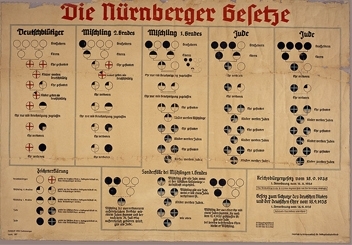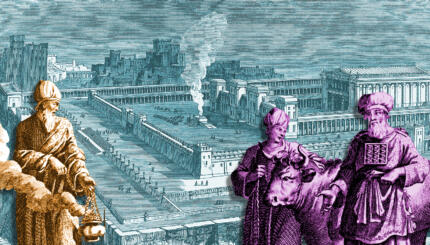The Nuremberg Laws of 1935 officially excluded Jews from German citizenship and limited their rights as members of society. Also included in the Nuremberg Laws were specific definitions of who was legally considered a Jew.
September 15, 1935
Thoroughly convinced by the knowledge that the purity of German blood is essential for the further existence of the German people and animated by the inflexible will to safe-guard the German nation for the entire future, the Reichstag has resolved upon the following law unanimously, which is promulgated herewith:
SECTION 1

Help us keep Jewish knowledge accessible to millions of people around the world.
Your donation to My Jewish Learning fuels endless journeys of Jewish discovery. With your help, My Jewish Learning can continue to provide nonstop opportunities for learning, connection and growth.
1. Marriages between Jews and nationals of German or kindred blood are forbidden. Marriages concluded in defiance of this law are void, even if, for the purpose of evading this law, they are concluded abroad.
2. Proceedings for annulment may be initiated only by the Public Prosecutor.
SECTION 2
Relation outside marriage between Jews and nationals for German or kindred blood are forbidden.
SECTION 3
Jews will not be permitted to employ female nationals of German or kindred blood in their households.
SECTION 4
1. Jews are forbidden to hoist the Reich and national flag and to present the colors of the Reich.
2. On the other hand they are permitted to present the Jewish colors. The exercise of this authority is protected by the State.
SECTION 5
1. A person who acts contrary to the prohibition of section 1 will be punished with hard labor.
2. A person who acts contrary to the prohibition of section 2 will be punished with imprisonment or with hard labor.
3. A person who acts contrary to the provisions of section 3 or 4 will be punished with imprisonment up to a year and with a fine or with one of these penalties.
SECTION 6
The Reich Minister of the Interior in agreement with the Deputy of the Fuehrer will issue the legal and administrative regulations which are required for the implementation and supplementation of this law.
SECTION 7
The law will become effective on the day after the promulgation, section 3 however only on 1 January, 1936.
Nuremberg, the 15th day of September 1935 at the Reich
Party Rally of Freedom.
The Fuehrer and Reich Chancellor
Adolph Hitler
The Reich Minister of the Interior
Frick
The Reich Minister of Justice
Dr. Goertner
The Deputy of the Fuehrer
R. Hess
The Nuremberg Laws on Citizenship and Race:
September 15, 1935
The Reich Citizenship Law of September 15, 1935
THE REICHSTAG HAS ADOPTED by unanimous vote the following law which is herewith promulgated.
ARTICLE 1.
(1) A subject of the state is one who belongs to the protective union of the German Reich, and who, therefore, has specific obligations to the Reich.
(2) The status of subject is to be acquired in accordance with the provisions of the Reich and the state Citizenship Law.
ARTICLE 2.
(1) A citizen of the Reich may be only one who is of German or kindred blood, and who, through his behavior, shows that he is both desirous and personally fit to serve loyally the German people and the Reich.
(2) The right to citizenship is obtained by the grant of Reich citizenship papers.
(3) Only the citizen of the Reich may enjoy full political rights in consonance with the provisions of the laws.
ARTICLE 3. The Reich Minister of the Interior, in conjunction with the Deputy to the Fuehrer, will issue the required legal and administrative decrees for the implementation and amplification of this law.
Promulgated: September 16, 1935.
In force: September 30, 1935.
First Supplementary Decree of November 14, 1935
On the basis of Article III of the Reich Citizenship Law of September 15, 1935, the following is hereby decreed:
ARTICLE 1.
(1) Until further provisions concerning citizenship papers, all subjects of German or kindred blood who possessed the right to vote in the Reichstag elections when the Citizenship Law came into effect, shall, for the present, possess the rights of Reich citizens. The same shall be true of those upon whom the Reich Minister of the Interior, in conjunction with the Deputy to the Fuehrer shall confer citizenship.
(2) The Reich Minister of the Interior, in conjunction with the Deputy to the Fuehrer, may revoke citizenship.
ARTICLE 2.
(1) The provisions of Article I shall apply also to subjects who are of mixed Jewish blood.
(2) An individual of mixed Jewish blood is one who is descended from one or two grandparents who, racially, were full Jews, insofar that he is not a Jew according to Section 2 of Article 5. Full-blooded Jewish grandparents are those who belonged to the Jewish religious community.
ARTICLE 3. Only citizens of the Reich, as bearers of full political rights, can exercise the right of voting in political matters, and have the right to hold public office. The Reich Minister of the Interior, or any agency he empowers, can make exceptions during the transition period on the matter of holding public office. The measures do not apply to matters concerning religious organizations.
ARTICLE 4.
(1) A Jew cannot be a citizen of the Reich. He cannot exercise the right to vote; he cannot hold public office.
(2) Jewish officials will be retired as of December 31, 1935. In the event that such officials served at the front in the World War either for Germany or her allies, they shall receive as pension, until they reach the age limit, the full salary last received, on the basis of which their pension would have been computed. They shall not, however, be promoted according to their seniority in rank. When they reach the age limit, their pension will be computed again, according to the salary last received on which their pension was to be calculated.
(3) These provisions do not concern the affairs of religious organizations.
(4) The conditions regarding service of teachers in public Jewish schools remains unchanged until the promulgation of new laws on the Jewish school system.
ARTICLE 5
(1) A Jew is an individual who is descended from at least three grandparents who were, racially, full Jews…
(2) A Jew is also an individual who is descended from two full-Jewish grandparents if:
(a) he was a member of the Jewish religious community when this law was issued, or joined the community later;
(b) when the law was issued, he was married to a person who was a Jew, or was subsequently married to a Jew;
(c) he is the issue from a marriage with a Jew, in the sense of Section I, which was contracted after the coming into effect of the Law for the Protection of German Blood and Honor of September 15, 1935;
(d) he is the issue of an extramarital relationship with a Jew, in the sense of Section I, and was born out of wedlock after July 31, 1936.
ARTICLE 6.
(1) Insofar as there are, in the laws of the Reich or in the decrees of the National Socialist German Workers’ Party and its affiliates, certain requirements for the purity of German blood which extend beyond Article 5, the same remain untouched…
ARTICLE 7. The Fuehrer and Chancellor of the Reich is empowered to release anyone from the provisions of these administrative decrees.




